What types of personalities are there and how to determine your psychotype?

Even the most introverted people, employed in a purely technical sphere, are forced to constantly contact someone. And they need up-to-date knowledge from the field of scientific psychology about what kind of person they may meet. Such information is even more important for managers, for employees of personnel departments, security services of enterprises.

Definition of personality in psychology
One of the first researchers who seriously approached the establishment of personality typology was the famous Carl Gustav Jung. It was he who noticed that the discrepancies between the predictions of psychological theories and real practice are associated precisely with the characteristics of specific people. The famous psychiatrist and theorist of psychological research proceeded from the fact that there are so-called archetypes, that is, elements of the collective unconscious, cultural innate structures. Jung believed that prototypes are hidden in the deep layers of the unconscious, far beyond what is usually considered a person. He argued that men have separate "female" archetypes, and women, respectively, "male" archetypes.
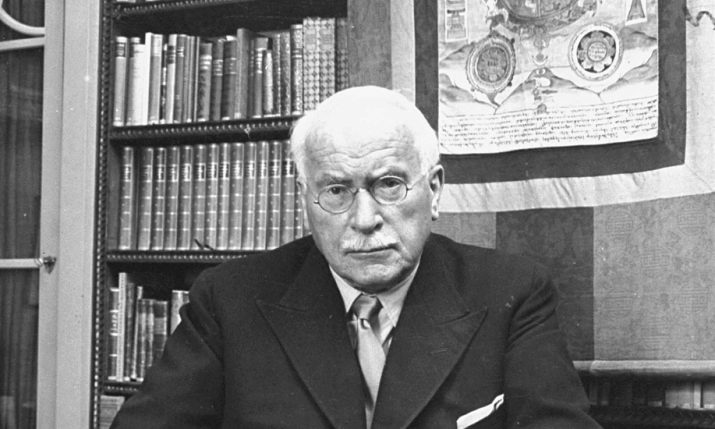
But in addition to a general definition of the structure of personality, Jung introduced his own classification of it.
It was this specialist who proposed the division into extroverts and introverts. The first are focused on interaction with the outside world, and the second - on purely internal experiences.Contrary to popular belief, the outstanding psychologist did not directly link these statuses and the level of sociability. The extrovert, according to Jung, has rather weak control over internal mental processes, simply because he pays little attention to them.
Such a person for the most part tries to change external circumstances, and not his attitude towards them. For extroverts, the priority of the collective and the whole over the individual principle and particular moments is typical. Introverts, on the other hand, focus on internal mental processes. They love to contemplate their thoughts and analyze experiences, motives, correct mistakes. But it should not be assumed that an introvert is always selfish - special studies have shown the incorrectness of this judgment.
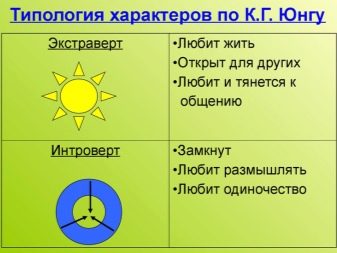
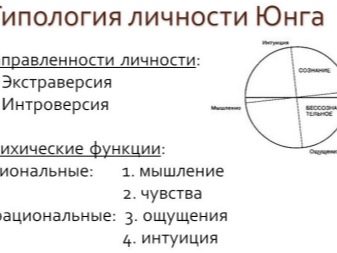
Jung did not classify only on the basis of extraversion and introversion. He divided people into rational and irrational types. The point is no longer whether external or internal moments play the main role, but how exactly they are comprehended. The rational person has a well-articulated approach that can change depending on the situation, but very slowly and only under compelling circumstances. Such a person is prudent and careful, most often acts consistently, according to a clear scheme.
The irrational part of people is distinguished by increased sensitivity, reacts to everything emotionally. This reaction often outstrips rational thinking and even hinders it. Reasonable reasoning affects such individuals very weakly, but sympathies and antipathies strongly influence. Jung also took into account such personality traits as sensation and intuition. But his system of classifying people is not the only one that is used in practice - there are more common approaches.


4 psychotypes by temperament
The most common variant of the classification of personality types is the allocation of 4 temperaments. This is the name of the system of human properties, which are largely determined physiologically and are expressed in psychological processes and phenomena. Only with great difficulty and for a short time is it possible to consciously behave differently from what the temperament dictates. For any length of time, it will still break through to the surface.
Temperament is genetic.

Sanguine
This human type easily comes into contact with children and is distinguished by its cheerfulness. It is not difficult for sanguine people to switch from one area of activity to another, to adapt to a non-standard environment for themselves. Usually such people speak loudly and quickly, facial expressions and gestures clearly express the experienced emotions. Sanguine people desperately need something new and fresh all the time, then they retain an interest in the life around them. It is at such moments that people of this temperament are perceived by those around them as active, active, capable of “moving mountains”.
But everything changes when sanguine people have to do long, monotonous work. Then interest in the case quickly weakens, replaced by indifference and lethargy. Only very disciplined or tightly sanguine people do not overtly show boredom. The emotions of such people do not differ in particular depth, they can be replaced by the opposite mood in a very short time. And yet, a positive attitude dominates.


Choleric
Like representatives of the sanguine type, these people are distinguished by increased activity and sociability. But there is also a serious difference between them. Choleric people are even less balanced than sanguine people, they are distinguished by increased excitability and irascibility. Where some are restrained, others are impetuous and easily irritated. Gestures are sharp, and even non-specialists can easily guess from the facial expressions about the really experienced emotion.

Choleric people can take up work, for another business with the greatest enthusiasm, make a lot of effort.Serious difficulties are unlikely to just stop them. However, it must be borne in mind that with a choleric temperament, the supply of nerve forces can quickly and suddenly become scarce. Sometimes the idea is abandoned halfway through, or at least the approach is drastically changed, new assistants are attracted. When communicating with others, choleric people find it difficult to behave correctly, to restrain irritation if something does not suit them.
With such a temperament, it is extremely difficult to approach others objectively. In the event of any misconduct, violation of obligations, even the smallest, they often break down, break off relations. That is why it is difficult to communicate with choleric people. It is difficult for them to admit the erroneousness of the decision made and "play back".
People themselves need to restrain themselves, and others should be more tolerant of them.

Phlegmatic person
A feature of this character of a person is slowness and poise. In all actions, calmness and thoughtfulness are found. Once started, they try to bring it to its logical conclusion, even if you have to make a lot of efforts and overcome difficulties. But one must understand that such success is achieved somewhat slower than in people with other temperaments. Emotions in phlegmatic people are poorly expressed, it is rather difficult to recognize them.
Their sociability is moderate: it is not difficult to talk to anyone, but there is also no particularly acute need for communication. The mood changes slowly, usually set at once for the whole day. Some very serious things have to happen for it to change quickly. Endurance and composure in the most difficult situations is a strong trait of phlegmatic people. However, they also have problems: their behavior is often sluggish and inert, and an indifferent attitude develops towards many things.

Melancholic
The last of the four temperaments, like the phlegmatic one, is characterized by a slow course of mental processes. It can be extremely difficult to interest melancholic people in something, to motivate them to be active, especially when they are associated with great efforts and losses. Emotions develop gradually, but they can reach great depths. It is very easy to insult, offend melancholic people (although outward manifestations are weak).
Such people:
- often withdraw into themselves;
- with difficulty master the completely new and unusual;
- are able to act effectively if the situation is well mastered.

In ancient times, the principles of distinguishing types of temperament were fantastic: they were associated with the predominance of certain fluids in the body. Only in the 19th-20th centuries did it become possible to define such human characteristics as manifestations of one or another type of nervous system. Thanks to the research of I.P. Pavlov, it was found that the main factor influencing temperament is how strong the nervous system is. They also take into account the rapidity of the change in excitation and inhibition.
According to Pavlov, there are 4 types of the nervous system:
- weak (both excitement and inhibition are slowed down) - these are melancholic;
- strong (easily irritated, moderately strongly inhibited) - choleric;
- strong balanced - sanguine;
- strong balanced with a slow course of mental processes - phlegmatic.
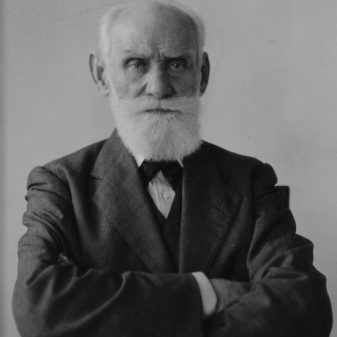
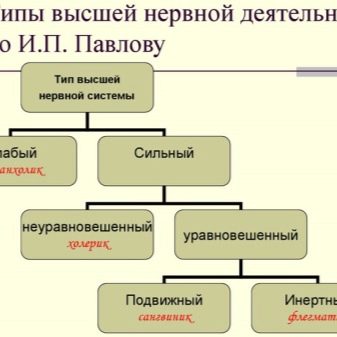
Such a characteristic as strength also has a completely material nature.
It expresses the readiness of nerve cells to work in an intense mode for some time without the need for rest. It is generally accepted that the stronger the nervous system, the higher a person's resistance to stress. If this power is great, people can act practically without problems even in unfavorable and unpredictable conditions. They can recuperate in a short time, then return to their previous occupation without much difficulty.
It is possible to recognize all types of psyche, including unstable ones, by external signs and behavioral features. So, sanguine people for the most part:
- medium or shorter height;
- are characterized by a wide bone;
- are overweight;
- have a slightly rounded forehead.
Phlegmatic people outwardly usually of a heroic physique, slow and reasonable, have a square or rectangular body. Such people walk confidently and calmly. The bodies of phlegmatic persons are dense and massive. Of the negative properties, a tendency to obesity can be noted. The limbs are small to medium in length.
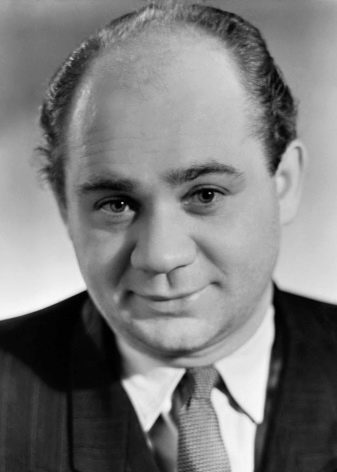

Choleric people are constantly moving, they can hardly sit still. Outwardly, they look like fragile and thin people with a pointed chin. Choleric cheekbones also sharpen. The tip of the nose is located below its base. The very shape of the nose is very clear, well recognized from afar.
The face of the melancholic is refined; if there is no particular reason for joy, you can easily catch a strong longing in the look. A typical melancholic is thin, has relatively thin and elongated bones and muscles. The pelvis is wide, but the waist is narrow. Another pronounced feature is the acute angle formed by the ribs. All these patterns are deduced statistically, therefore, judgments about a person's temperament by his appearance are often erroneous.

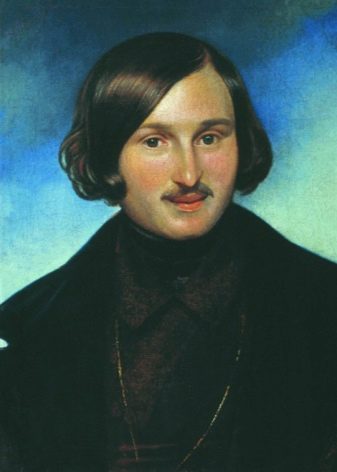
It should be borne in mind that in "pure form" the described temperaments are extremely rare.
Trained psychologists take into account a number of basic properties in their classification:
- sensitivity;
- the severity of the reaction;
- ability to change;
- level of inertia.
Professionals also believe that leadership characteristics can appear in representatives of any temperament. It depends on what type of tasks needs to be solved, how global it is, whether novelty or routine aspects prevail. The opinion of melancholic people as loafers has little meaning. They often reflect, simply not showing emotion.
Hysterical antics can happen to everyone, even those who are usually considered calm and cold-blooded people; creativity, too, is not rigidly bound to temperament.


16 socionistic types
In addition to temperaments, there is also a division into groups distinguished by socionics. Specialists on it are guided by three points:
- perception of incoming information;
- features of its processing;
- the specifics of interaction with the external environment.
Socionistic psychological types are named vividly and figuratively. So, "Dostoevskys" they are distinguished by good upbringing and tact, they sympathize with those who are weaker. They know how to understand the characteristics of other people, very quickly and easily assess who, with whom and in what relationship. "Don Quixotes" behave irrationally, easily breaking the established patterns. Such a person in any situation discovers several methods of action and quickly makes the right decision.
"Don Quixote" are able to see the hidden potential in every little thing. They skillfully use any weakness of an opponent, and any valuable property of an object, and a favorable chance given even for a short time. The Yesenin sociotype is characterized by the ability to feel, even in many respects intuitively, the most convenient moment for a particular step. It is easier for Yesenin than for other people to predict further developments.
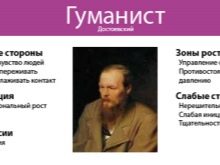
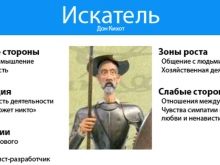
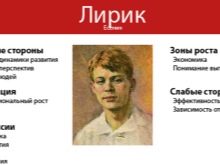
Sociotype "Stirlitz" notable for the fact that he knows how to act both offline and as an organizer equally effectively. Such people are also characterized by the ability to do their job in the most comfortable way, even in an unfavorable, alarming environment.
Sociotype "Jack London" characterizes a person who treats everything pragmatically, from the standpoint of benefit or harm. Any information, any person met on the path of life, free time, and so on - all this is assessed as a resource for achieving the goal or as a hindrance in solving the task. But "Hamlet" is sharply emotional, able to catch even the weak emotions of other people; this ability can be used to push in the right direction.
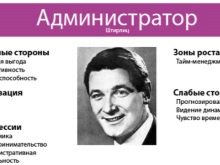
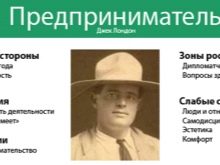

"Robespierres" are distinguished by three properties:
- strict punctuality;
- responsibility to oneself and others;
- thirst for justice.
If a person puts personal comfort and harmony in the surrounding space in the first place, then this is "Gaben"... Representatives of this sociotype feel good in a calm, orderly environment, but conquering new heights, exploring the previously unknown for them is hardly suitable. So-called "Balzac" immediately discovers problems and shortcomings where others do not notice them. But it is precisely this property that can cause a lot of problems for a person.
Often, his statements are assessed as cynical, rude, and he himself - as an unreasonable pessimist.


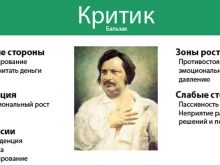
Type of "Huxley" can also notice what is hidden from other people, but we are already talking about implicit possibilities. Ethical considerations are more valuable to them than logical constructions. Often, "Huxley" puts forward frankly fantastic ideas and designs. Curiosity is peculiar to them. The memory is usually very strong.
"Maxims Gorky" - the clear opposite of "Huxley". Such a person puts logic in the first place. No wonder: he knows how to recognize causation like no other. Rational thinking dominates in all respects. And here "Dreiser" - something in between. For such people, logic is important, but they try to follow strict moral principles, and if they notice a deviation from them, they immediately criticize it.
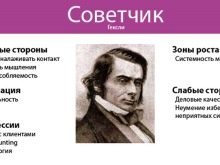
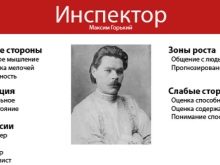
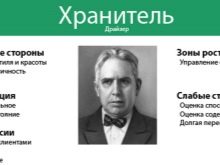
Type of "Dumas" Is an introvert who prefers to view the world around him subjectively. A comfortable environment for them is needed in any case. The more harmonious the environment, the better. Sociotype "Napoleon" fully corresponds to the characteristics of the famous commander. He is characterized by a strong will, persistence in achieving his goal and the ability to go towards it, even if the situation is unfavorable.
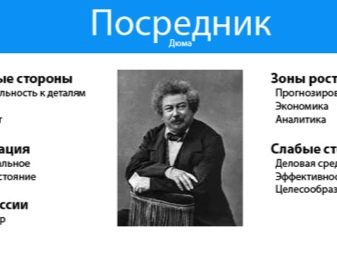
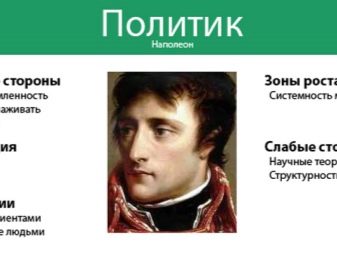
And here is the type "Zhukov" it was selected incorrectly, on the basis of a black myth, which hardly has any real historical basis. This is how overly selfish people are called in socionics. Feature - the desire to achieve the task at any cost and strictly at a certain moment.
Finally, it is worth saying about the psychotype. "Hugo", which is characterized by cheerfulness and energy. Such people are invariably positive even in small things, pleasant to talk to.
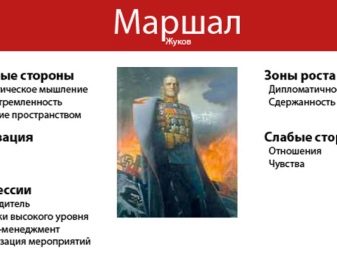
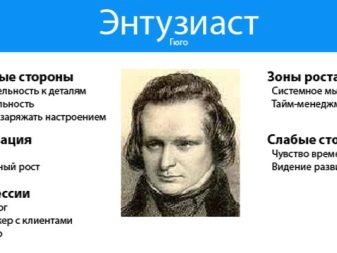
People in conflict situations
But whatever gradation of personalities is considered, all the properties described above are manifested only in a normal work and daily environment. And any person sooner or later has to participate in various conflicts. Behavior in such a situation also allows you to classify people. The concept of Obozov received a certain distribution. The so-called "practitioners" always try to attack in order to defend themselves more effectively.
If they are involved in a conflict, then it is more often delayed and aggravated. This is due to the fact that the practitioner always tries to correct the position of those around him in the way he wants. Small skirmishes are perceived by him superficially, as something insignificant. Because of this, the relationship after a quarrel can be broken up to the final disagreement.

The “interlocutors” are the complete opposite of the practices.
These people try to maintain good relations and communicate to the last. For the sake of this goal, they are even ready to sacrifice part of their own comfort or positions, not to take advantage of certain advantages during the conflict. Arguments in the dispute are carefully selected, trying to avoid sharp attacks and transitions to personalities. The "interlocutor" immediately notices who thinks how. He is ready to accept the opinion of another person and even cooperate with those who think fundamentally differently.
According to Obozov, the third type is the “thinker”. Such a person tries to have the most clear idea about himself, about other people and about the outside world. When the thinker is involved in a conflict, he does not seek to respond first or under the influence of emotion.On the contrary, he carefully constructs a system of argumentation, trying to make it logically flawless and invulnerable to criticism. Caution is less common in thinkers than in interlocutors.

Demonstrative
Along with the three-tier convoy system, there is also a division of conflicting people into four types. A demonstrative person always strives to be in the center of everyone's attention. For him, the subjective opinion of others is very important. The demonstrator knows how to adapt to the changing environment. Due to the peculiarities of behavior, it often provokes the onset of collisions, although it may not be aware of it or deny it.

Regular
Such people are characterized by suspicion and excessively high self-esteem. If your own significance is not confirmed in one way or another, "the day is wasted." A rigid person is inclined to go to his goal to the end, not taking into account the changed situation. Moreover, the needs and suffering of other people are of little importance to him. If an act or inaction at a certain moment helps to achieve a goal, rigid people will hardly agree to admit it is wrong, to reconsider their assessments.

Uncontrollable
Representatives of this type are characterized by impulsiveness and weak self-control. Even they themselves cannot always predict how they will behave after a while or in certain circumstances. For such a person, norms and decency are important only to the extent that violation of them entails condemnation and sanctions. Sometimes, however, even the likelihood of severe punishment for one or another act does not stop them.
An uncontrollable person prefers to blame others and external circumstances, even in cases where his guilt is completely obvious.

Ultra-precise
For bosses, such a sociotype of a subordinate is attractive for his scrupulousness in work and increased demands on himself. But at the same time, everyone with whom such a person interacts quickly realizes his pickiness, even for unnecessary nuances. An extremely accurate personality is also characterized by anxiety, a constant fear that something will go wrong. In case of any failure, accusations and self-accusations begin, the search for interfering people or provocateurs begins. Nervous breakdowns or even psychosomatic disorders are likely on this basis.

How to determine your psychological affiliation?
To begin with, you should realize that everything said above is largely conditional. Absolutely identical people do not exist, and even the properties of temperament or character can change over time. Introspection is the first step in determining psychological belonging. When analyzing actions, you need to pay attention to:
- a tendency to participate in conflicts;
- strategy with such participation;
- preferred type of activity;
- speed of decision making;
- sharpness of judgment;
- the ability to change your mind or lack of such ability.
For information on how to determine the psychotype of a person, see the next video.








